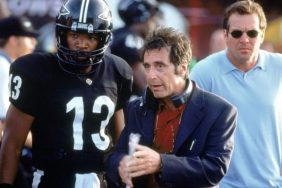It’s been said that football has replaced baseball as America’s favorite pastime. We ain’t going to argue with that. It’s certainly one of the most cinematic sports around, complete with hard-hitting action, dramatic rivalries and frequent breaks to plan the big play that’s just bound to win the game, even if the coach is screaming at our hero quarterback to follow his commands.
The latest movie in the American football genre, Draft Day, comes out this Friday, and it got the CraveOnline film critics thinking: out of the dozens of great football films Hollywood has produced over the years, what’s The Best Football Movie Ever? William Bibbiani, Witney Seibold, Fred Topel and Brian Formo each have their own picks. Check them out on this week’s edition of The Best Movie Ever, then vote for your own favorites at the bottom of the page.
Brian Formo:

For a film fan that skews arty, football probably has too large of a presence in my life.
I read about offseason roster turnover on the clock. I’ve been the commissioner of a fantasy football league for six years (IDP, 12 members, double-match playoffs). And when my long-suffering, child-chosen-sports-squad the Seattle Seahawks won their first Super Bowl, I cracked a rib in celebration.
However, being a football fan and a film snob makes me a football film snob. I don’t think there are any great films about football. Why? Because they never film football correctly. Games always seem to be played in the thickest of mud with no overhead lights. Runners are always tackled in unsound methods so they’ll flip over their heads. Or – better yet – lightning will inspire them to climb the backs of the linemen in front of them. Cool! And touchdowns are always scored on the last play of the game. And usually by a quarterback that goes against the coach’s play and decides to do give an offensive lineman the ball because they’ll never expect it! As a football fan it’s offensive. These things never happen.
The most realistic football film was probably Friday Night Lights. But that film was outdone by the TV show it spawned. The football in the TV series was laughable – for all the reasons mentioned above and more (hey, let’s just create a neutral field on someone’s farmland to play two days from now!) – but the drama between the players (and especially the coach’s marriage) made that series amazing.
Since I’m football-nerd repulsed by most football movies, I’m gonna have to go with the emotional football flick. I was named after Brian Piccolo (James Caan) in Brian’s Song, after all. My dad was a big Bears fan. He loved Gale Sayers (Billy Dee Williams). He played defensive tackle in high school and college. He coached throughout my adolescence. I was never any good at playing football and was really small. I started skipping practices. I’d pretend to pedal off to practice but I passed the time in my neighborhood record and video stores.
Skipping football practice helped form my artistic presence. So I am aware that Brian’s Song isn’t “good.” But it is a great, weepy melodrama. It’s future Sonny Corleone and future Lando Carlissian bonding over their attempts to defeat the internals: team racism and cancer! And it made my dad cry.
For decades it’s been outlined in the (outdated) Dad Bible that Brian’s Song is the only acceptable movie for men to cry at. So – for giving that generation it’s own manly Terms of Endearment – and until someone films football as it’s actually played, Brian’s Song will still be the Best American Football Movie.
Fred Topel:

Rudy has become a cultural touchstone. Rudy Ruettiger (Sean Astin) dreams of playing football for Notre Dame, even though he is way too small to make any team, let alone one of the most prestigious in the nation. But through sheer work and determination, Rudy earns a place on the bench. Spoiler alert for the real Rudy Ruettiger, Notre Dame gets so far ahead in their final game of his tenure that they’re able to put Rudy in with no risk of losing, so he’s able to play.
The score by Jerry Goldsmith makes every coach’s speech or montage feel monumental, and that’s what someone like me needs. I can’t relate to dreaming of playing a sport, but I can relate to the broad strokes of any one thing being your entire world. Every step of the way is a hurdle for Rudy, even finding a place to sleep on campus. His relationships are heartfelt with teammates and campus staff, because you’d hope to be able to approach life with as much purity as Rudy. You feel it and Rudy simply reading his acceptance letter is tear-jerking. Rudy is also a family story, as Rudy struggles to get his father (Ned Beatty) to acknowledge that he’s made it.
When Rudy came out, I remember the film critic in my Annapolis, MD newspaper complained that Rudy shouldn’t be considered a Rocky story because Rudy doesn’t win the game in the end. By 1993 people already forgot that Rocky didn’t win the first fight either. Just making it to the big game is a victory, one that remained relevant in the decades since Rocky and still does today.
William Bibbiani:

My father never sat me on his knee and told me about the history of his favorite football team. Or baseball team for that matter. Or any other sport. I vaguely remember him watching football once in a while but neither he nor anyone else in my family ever seemed to care very much who won, or told me how the actual game works. I learned everything I know about sports, including American football, from movies. So my perspective may be skewed. I still think Necessary Roughness is pretty cool.
But I love sports movies to death. Sports provide a remarkably cinematic way to dramatize a hero’s emotional and physical development, complete with regular competitions, training montages, inspiring speeches and valuable lessons about discipline, training and teamwork. This is why underdog stories work so well within the context of sports: very few other genres provide such an effective framework for showing how someone with little to no talent can better themselves and become, if not the best, then at least respected, confident, better people. With that criteria in mind, David Anspaugh’s Rudy may be the best football movie ever. If it weren’t for Rocky (and maybe Warrior and The Sandlot), it might even get my vote for the best sports movie period.
Rudy Ruettiger (Sean Astin) was “five foot nothin’, a hundred and nothin’, and hardly (had) a spec of athletic ability,” but he still managed to play football for Notre Dame, on the practice team at least, for two years. He accomplished this through sheer moxie, an almost psychotic determination to please his father that nearly blinded him to the fact that, over the course of his almost total failure to play a single game, he become an impressive, respectable, well-educated human being in the process. His single-minded determination to achieve his dream of relatively modest sporting glory – he would have been content just to be seen on the sidelines – became a powerful driving force that illustrated just how much good can come of sports, even to a guy like me who never cared for them. Rudy always leaves me cheering at the end, eager to suddenly run a mile, even though I typically give up hacking and wheezing by the time I get a block from my apartment.
Witney Seibold:

In a famous stand-up routine, comedian George Carlin contrasted baseball and football, commenting on how they were fundamentally different. Baseball was a laid back, friendly, pastoral game of American nostalgia, while football was a hard-edged, violent, merciless war struggle between nations. This comparison proves salient in the movies based on those respective sports. Baseball movies tend to be all about romance and Americana, while football movies tend to be about conflict and power. Sure, plenty of football movies can be pastoral and romantic, but for the most part, feature films about American football are about triumph, overpowering, and proving your mettle.
So if football is to be seen as a 20th century combative struggle, I can think of no better football movie than Oliver Stone’s oft-forgotten 1999 football epic Any Given Sunday. Stone’s movie does not have a twinge of classicism hanging about it – it’s flashy, blunt, and noisy – but it does seem to be an honest attempt to condense every football movie trope into a single film. The aging coach, the aging star, the new hotshot, the cutthroat team owner, and the Big Game: all are present in Any Given Sunday, all delivered (exhilaratingly) with Stone’s complete lack of aesthetic grace or subtlety. What’s more, the football-as-combat metaphor in on full display here (as we may expect from Vietnam vet Stone), complete with bomb and machine gun sound effects played over the games.
Starring just about everyone (Al Pacino, Dennis Quaid, Cameron Diaz, James Woods, Jamie Foxx, LL Cool J, Matthew Modine, Ann-Margret, Aaron Eckhart, Elizabeth Berkley), Stone set out to make the football movie to end all football movies. And I feel that, at the end of this tiring and overwhelming 162-minute cinematic jaunt, he may have succeeded. You have to give props for mere ambition.








